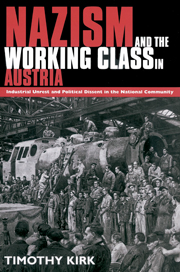 Nazism and the Working Class in Austria
Nazism and the Working Class in Austria Book contents
- Frontmatter
- Contents
- List of tables
- Acknowledgements
- Maps
- Introduction
- 1 Austrian fascisms, ‘Austrofascism’ and the working class
- 2 Economic integration and political opposition between the Anschluss and the war
- 3 The war economy and the changing workforce 1939–1945
- 4 Work discipline in the war economy
- 5 Popular opinion and political protest in working-class communities
- Conclusion
- Notes
- Select bibliography
- Index
4 - Work discipline in the war economy
Published online by Cambridge University Press: 06 January 2010
- Frontmatter
- Contents
- List of tables
- Acknowledgements
- Maps
- Introduction
- 1 Austrian fascisms, ‘Austrofascism’ and the working class
- 2 Economic integration and political opposition between the Anschluss and the war
- 3 The war economy and the changing workforce 1939–1945
- 4 Work discipline in the war economy
- 5 Popular opinion and political protest in working-class communities
- Conclusion
- Notes
- Select bibliography
- Index
Summary
Some of the most important changes determining industrial relations and work discipline in the Third Reich had already been effected before the outbreak of the war. By September 1939 the conditions that prevailed in Austrian industry were those that had been shaped in the Altreich since 1933. Austrian workers, no less than Germans, had experienced a ‘reordering of class relations’ (in so far as this had not already happened before the Anschluss). Similarly, economic integration had produced the rearmament boom and labour shortages which Germany had already experienced for two years or more. These new conditions meant that, even without trade unions, workers in many industries were again in a position to bargain for higher wages and better conditions. Their bargaining position was, of course, more circumscribed than it had been when full employment had first been achieved in Germany, because measures had been taken to regulate both wages and labour mobility.
Even before the war the reorientation of the economy towards rearmament had meant that the state increasingly had become industry's most important customer and would have to foot a large part of the bill for any increase in wages. Controls on wages and labour mobility had been imposed in 1938, but these were circumvented by workers and employers alike: the former were happy to leave their jobs for better paid employment; the latter were prepared to poach them rather than lose lucrative government contracts for want of skilled labour. This created inflationary pressures which tighter controls on labour mobility were intended to curb.
- Type
- Chapter
- Information
- Nazism and the Working Class in AustriaIndustrial Unrest and Political Dissent in the 'National Community', pp. 86 - 108Publisher: Cambridge University PressPrint publication year: 1996
